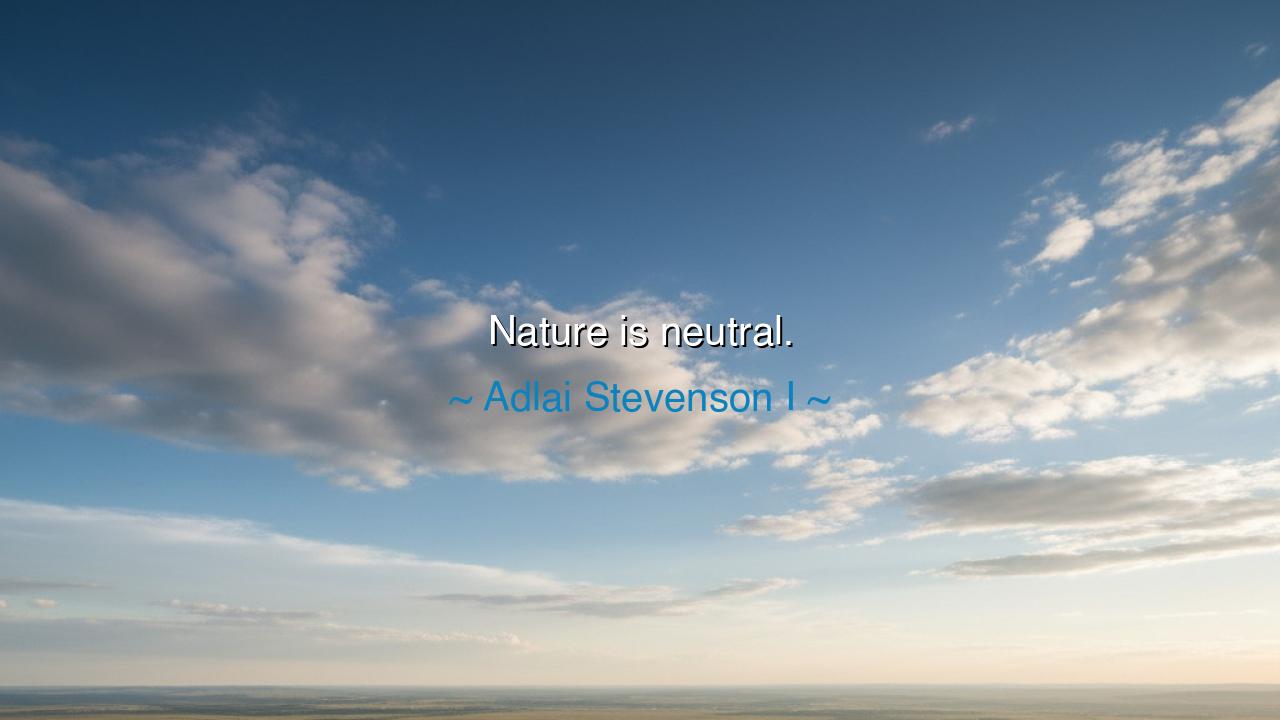
Nature is neutral.






Adlai Stevenson I, a statesman of the American nineteenth century, once uttered with simple finality: “Nature is neutral.” In these three words lies a truth as vast as the oceans and as unshakable as the mountains. Nature, in her immensity, is neither kind nor cruel, neither just nor unjust; she simply is. The rising of the sun, the falling of rain, the quaking of the earth — these are not gifts nor punishments, but the eternal workings of forces beyond man’s will. To ascribe to nature human motives is to misunderstand her. She is not moved by our prayers or our wrath; she moves only in the rhythm of her own laws.
The origin of this insight arises from the long contemplation of man’s struggle with the world around him. In Stevenson’s age, as in all ages, people sought meaning in storms, in plagues, in famine and flood. Some saw punishment, others blessing. Yet Stevenson declared plainly: nature is neutral. She does not bend herself to our virtues or our vices. She scatters sunlight upon the righteous and unrighteous alike; she sends storms upon the strong and the weak without preference. To grasp this is both sobering and liberating: sobering, because it shows the smallness of man in the face of the cosmos; liberating, because it calls us to live wisely within her laws, not to expect her to bend to ours.
History offers countless witnesses to this truth. Consider the eruption of Mount Vesuvius in 79 A.D., which buried Pompeii and Herculaneum in ash. The citizens who died were not singled out for their sins; they were caught in the path of a neutral force. The volcano did not punish; it simply erupted. Or recall the Titanic, hailed as unsinkable, struck down not by malice but by the cold indifference of ice. Nature neither sought to humble nor to exalt humanity. She merely remained herself — vast, impartial, unmoved.
Yet the neutrality of nature does not make her meaningless. On the contrary, it makes her the greatest teacher of all. Her indifference forces us to awaken responsibility within ourselves. If storms strike, let us build stronger homes. If drought comes, let us learn to conserve and cultivate wisely. If disease spreads, let us study her laws until we discover remedies. In her neutrality, nature compels us to grow, to act, to rise above helplessness. She will not protect us, but she gives us the field upon which our courage and ingenuity are tested.
There is also wisdom here for the soul. Many times men rail against fate, cursing the heavens for their misfortunes. But Stevenson’s words remind us: the heavens are silent, not cruel. Nature is not against you; she is simply indifferent. What matters is how you respond. The flood may rise, but will you sink or will you swim? The night may fall, but will you despair or will you kindle a fire? This is the lesson of neutrality: it is not nature who decides the outcome of your life, but the will you bring to meet her challenges.
What, then, shall we practice? Let us learn the laws of nature, for they will not change for us; we must change for them. Let us cultivate humility, knowing that we are not masters, but stewards. Let us also cultivate resilience, for though nature is impartial, the human spirit is not — it can love, protect, endure, and create meaning even where none is given. And above all, let us not waste time demanding mercy from that which has none, but rather extend mercy to one another, for only man can give to man the compassion nature withholds.
Therefore, O children of earth, remember Stevenson’s words: “Nature is neutral.” Do not curse her for her storms nor worship her for her calm. Accept her as she is: vast, impartial, eternal. And in that acceptance, find your calling — to live wisely under her laws, to endure bravely in her trials, and to shine with love where she offers none. For it is in the face of her neutrality that the greatness of humanity is revealed — not in changing nature, but in changing ourselves.






AAdministratorAdministrator
Welcome, honored guests. Please leave a comment, we will respond soon